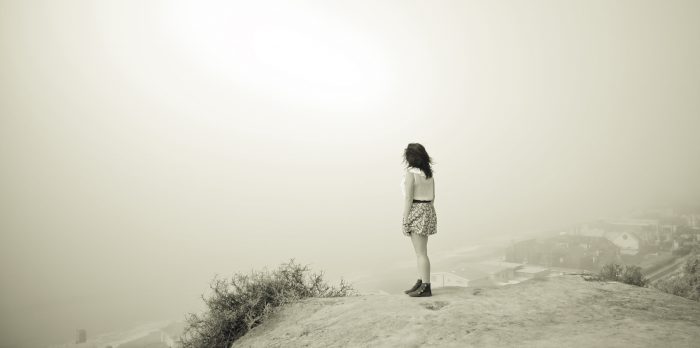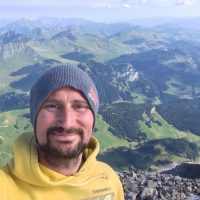We are told that uncertainty is hard for people to cope with. But what if it’s certainty that’s been killing us? And what if we have no other option?
Once upon a time I had a sort of map for my life.
It only existed in my head —as unquestioned assumptions — and it was vague but clear.
It went something like this:
Now, you’re 16. In a few years you’ll go to university and get a degree.
From there you’ll choose a career and you’ll work hard, increasing your earnings and rising in importance and responsibility, in some way.
You’ll marry, have children and, finally, some time after they’ve left home you may retire and do some of the things you’ve always wanted to do.
This was a kind of certainty about the world around me and my relationship to it.
I imagine this is very different to the 16-year-olds going to school this morning. Mine may have been the last generation to have such unchecked certainty about what lay before them.
One of the characteristics of where we seem to be at as a species right now, is that of uncertainty.
I hear all the time that human beings don’t like uncertainty. That they tend to panic when they don’t know what’s coming.
I’ve seen how they close down and tighten up to avoid it, creating false certainty, as hedges against the reality they can feel so clearly but weren’t trained for.
The thing is — I was never more miserable than when I had a clear map.
The university->career->work hard->retire->die path that lay before me in my mid-teens felt lifeless.
I think it’s when I started to experience what some people might call depression and anxiety.
I lacked any intrinsic energy to do the things lined up for me, I self-medicated and withdrew from all the life-giving, healthy interests I had as a young child.
No more: “I want to be an explorer” or wonder at the natural world around me.
Instead I felt like I had been kidnapped, blindfolded and marched into a grey corridor and told I had so much choice ahead of me… walk or crawl.
The kind of certainty I had then felt crushing and lifeless.
Breaking open into something real
As I headed into my mid-twenties, I guess I became increasingly skilled at cutting myself off from this dissonance that I felt.
Consumer society gave me everything I needed to not look at it. Cheap alcohol to numb me, endless choice to baffle me, mindless films and TV shows to distract me, smart phones to give me regular dopamine hits.
They all allowed me to plough on in a massive corporate environment, doing something I didn’t particularly enjoy with the sole purpose of making money for some distant shareholders.
When I finally cracked, imploding spectacularly at 25, at first it was horrific. At least once I imagined suicide being the only way to get away from what I was feeling.
With the usual crystal clear vision in hindsight, I can now see that this implosion was the result of persistently ignoring my needs, having exchanged the ability to listen to them for a paper thin story about money, security, approval and certainty.
The same story most of us have been fed — and have fed each other — over the past few generations in Western society.
I’d pushed myself as far as I could in that respect, extracted every bit of energy from myself and goodwill towards the world as I knew it, in exchange for what I thought was comfort.
Comfort in the idea I’d have a salary in three months (which after multiple rounds of redundancies in multiple companies, I can see how ridiculous that one was), comfort in the idea I’d be able to afford the things that distracted me from, or justified, the way I was living and working. Comfort in the very idea that somehow I mattered as a human being if I was in employment and constantly being seen to do more, and better.
Underneath, none of that energy was from a renewable source, because nothing I did was providing any renewal.
This is the kind of certainty that I think we’ve come to attach ourselves as a society.
And the extractive nature of working in this way, for the benefit of a small number of people who are no happier or satisfied than us, is played out across our natural world and how we’ve been exploiting it.
I’ve heard Martin Shaw, mythologist and founder of the West Country School of Myth, saying:
Here’s the bad news — we are not going to get a story worth hearing until we are broken open by our own consequence. That’s where we are, that’s what the time is telling us. The catastrophes that are moving around us right now, the pandemonium, the deep depression that many of us feel are — I’m afraid — part of the trade of the breaking open into something that is truly and profoundly real.
On a very personal level, what I’ve been experiencing over the past 10 years is a breaking open into something real.
It’s been fairly terrifying at times because it’s forced me to let go of the stories that I thought kept me safe.
But it’s also shown me what a profoundly real life might look like, and I am convinced that if humanity can understand the true potential of the uncertainty ahead of us, we may incite enough people to create something worth living for out of the lifeless ashes of consumer society.
Moving beyond the edges
We’ve reached the edge of our maps.
In ancient times, very few people would travel beyond those edges. Barbarians, monsters and terrifying perils would have been said to await any traveller foolish enough to venture out.
But again, we have no choice.
The story we have been telling ourselves has been a lie.
Not only has it been a lie, but it has been killing us and destroying the ground beneath our feet and the air in our lungs.
We are at our collective edge and the trembling that so many feel is understandably one that feels like terror.
Many people are experiencing the global equivalent of being told your house is on fire and all the doors are locked. Oh, and your mother has terminal cancer.
We are at our edge.
And while we can’t deny the data, we need to understand the difference been numbers and narrative.
The story many of us are telling each other is a closed and fatal one. It incites fear and anxiety, and it risks sending us down an even worse path than the one the data tells us we’re on.
This is because we are story-telling machines. Just like my ‘life map’ story that create so much suffering for me, the stories we tell become our reality.
It is time to tell a new story — to accept where we are, feel the despair and shame, and surrender to it.
As my friend Dougald Hine, Co-founder of Dark Mountain and A School Called Home says:
The hope worth having is that which lies at the far side of despair.
Once we — at some level — are broken open, and our failed stories seen for what they are, we can begin the first lines of the new tale.
But we need to tell it by living it. This is not something that a strategy paper or online platform can hope to achieve.
From extraction to regeneration
The term regenerative is being used a lot at the moment, and it’s one I can relate to.
When we stop pushing down and numbing our basic needs in the way nuclear, consumer society has designed us into doing, meeting them becomes natural.
In order to do this, one thing we have to learn is how to work with our nervous system.
Most of us have been conditioned, and continue to condition ourselves, into a persistent, low-level stress state.
It’s the fundamental basis of our media, advertising, politics and much more. We can see it in the constant need to blame, find quick solutions and create overly simplistic narratives.
It not only keeps us stressed and anxious but it closes us down to other people, preventing us from feeling empathy and being open to new and complex perspectives.
Ultimately it’s what’s got us to this point as a society, with the nature of inequality, division and blind destruction of the animals and habitats around us.
And, because our stress-culture maintains that state, we believe that to solve the problems we face, we must find culprits and knee-jerk solutions.
I’m not denying that corporations and governments have to do an enormous volte face, as quickly as they can, but those institutions are filled with people just like you and me.
So it has to start with each and every one of us understanding that instead of living in fight-or-flight, our greatest task is to take care of our state.
When we make choices that come from this place — of curiosity, inquiry, empathy, complexity — not only are the decisions we make ‘smarter’ but they have this regenerative (rather than extractive) quality that comes from no longer having to push, numb or fight our way through life.
As individuals, neighbourhoods, towns and countries, we’re not going to develop a society worth living in by trying to piece back together the ashes of the old story.
Instead, we have to to ready our boats, gather our people and set sail, knowing that while there’s much we can’t change — what we can change, and is worth changing — lies beyond the edge of the maps.









Read 1 comment and reply